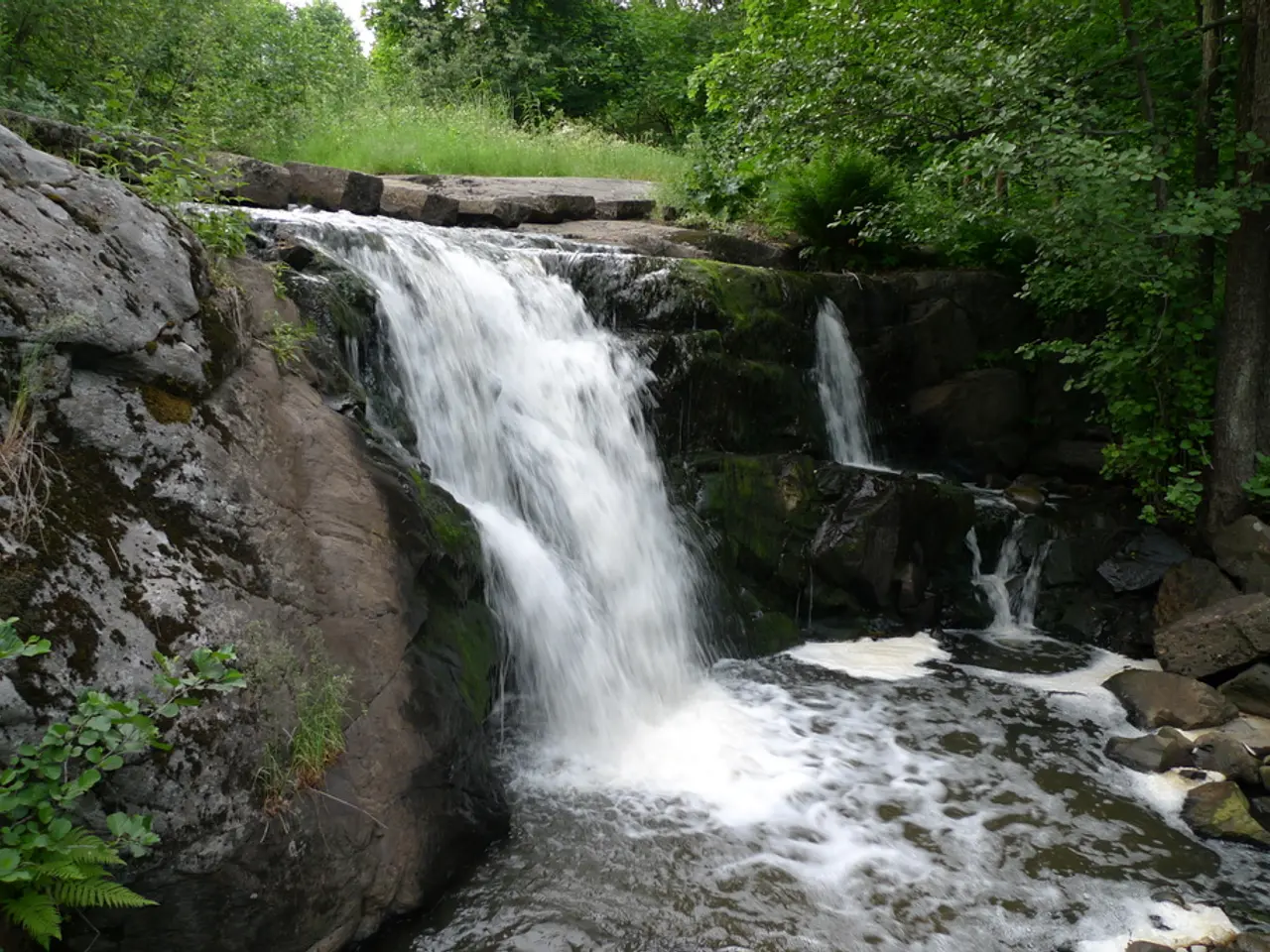Landslide claims seven lives, injures six individuals while they work to restore a water channel in the northern region of Pakistan
A devastating landslide in Gilgit-Baltistan, Pakistan, has claimed at least 40 lives and left thousands stranded, following days of torrential monsoon rains and cloudbursts. The disaster, which occurred on Sunday night, has also resulted in over 15 people missing and hundreds injured.
The incident took place when a group of 13 local volunteers were restoring a water channel from Danyor nullah to Danyor town. Tragically, the landslide resulted in the deaths of seven people and injuries to six others. Prime Minister Shehbaz Sharif expressed his deep sorrow over the incident and urged authorities to ensure the best medical treatment for the injured.
The disaster is part of an unusually intense and prolonged monsoon season that started late June. The region has also experienced an extreme heatwave, causing temperatures to rise 48% above normal and leading to unprecedented glacier melt. This, in turn, has destabilized river banks, hillsides, and infrastructure throughout the mountainous region.
Since June 26, torrential monsoon rains have resulted in at least 305 deaths and 734 injuries across Pakistan. In Gilgit-Baltistan alone, as of the data provided by NDMA, the region has reported 12 deaths and 6 injuries since June 26.
The disaster has caused widespread destruction, with over 300 homes fully or partially destroyed, bridges swept away, roads, electricity lines, mobile and internet networks damaged, and multiple districts isolated. Major highways and roads, including the Diamer–Ghizer, Shandur, Khalti, Dain, Ishkoman, and others, are blocked or severely damaged.
Local government teams and the Pakistan Army are currently conducting rescue and relief operations, clearing debris and escorting stranded people off blocked mountain roads. Emergency shelters and relief camps have been established, although officials warn that government resources are strained by the scale of damage.
The Gilgit-Baltistan Disaster Management Authority (GBDMA) and Pakistan’s National Disaster Management Authority (NDMA) have issued travel advisories urging citizens and tourists to avoid entering the region due to ongoing hazards and road closures. Restoration of roads, bridges, communication signals, and essential services is underway but remains challenging due to continuous rainfall and weather risks.
This severe natural disaster highlights the vulnerability of Gilgit-Baltistan’s mountainous terrain during the increasingly intense monsoon seasons, exacerbated by climatic changes leading to glacier melt and erratic weather patterns. The government has promised full medical facilities, compensation to the families of the deceased, and support for the injured and affected communities.
- The world watches as news of a devastating landslide in Gilgit-Baltistan, Pakistan unfolds, claiming at least 40 lives.
- Artists across the globe respond with paintings and songs expressing their solidarity and condolences.
- Healthcare professionals rush to the affected area, bringing much-needed aid and therapies and treatments.
- Scientists study the climate change effects in the East, linking the disaster to an unusually intense monsoon season.
- In the West, environmental scientists warn of the consequences of oil and gas extraction and its impact on the climate.
- Sleep deprived residents of the affected region struggle to cope with the loss and uncertainty, while others work to restore a water channel.
- Workplace wellness programs offer support and resources to help individuals manage stress during this difficult time.
- Medical conditions such as chronic diseases, cancer, and respiratory and digestive health issues receive increased attention.
- Eye health, hearing, and skin conditions also become a focus, with experts providing advice and resources to those affected.
- The disaster serves as a cautionary tale about the need for industry to prioritize health and safety and adopt renewable energy solutions.
- Mental health professionals offer counseling and support to those directly impacted by the disaster as well as to those affected by the news.
- Men's health issues receive increased attention, with a focus on cardiovascular health and nutrition.
- Women's health is also prioritized, with a focus on sexual and reproductive health, aging, and skin care.
- The disaster highlights the importance of family health, with a focus on parenting and weight management.
- Autoimmune disorders become a significant area of research and discussion, with scientists searching for newer treatments and therapies.
- The disaster sheds light on the need for effective policy and legislation to protect against climate change and prevent similar disasters in the future.
- The insurance industry braces for potential claims and adjusts policies to cover disaster-related losses.
- Fintech companies offer financial aid and support to those affected by the disaster.
- The disaster also has economic implications, with damages to retail, manufacturing, and transportation sectors.
- Public transportation is affected, with multiple routes affected by the disaster and road closures.
- Entrepreneurship opportunities emerge as individuals look for innovative solutions to help rebuild and restore the affected areas.
- The disaster disrupts the automotive industry, with manufacturing plants and supply chains affected.
- Aviation safety is also a concern, as airports in the affected region may be impacted by the disaster.
- The disaster underscores the importance of business continuity planning in the face of natural disasters.
- As the disaster unfolds, governments and international organizations offer aid and support, including medical supplies, food, and shelter.
- The disaster highlights the need for better regulation of the oil and gas industry to prevent similar disasters in the future.
- CBD products are marketed as a potential solution for managing stress and promoting overall health and wellness in the affected region.
- Neurological disorders receive increased attention, with experts offering resources and support to those affected.
- The disaster serves as a reminder of the importance of nutrition, with a focus on how diet can impact overall health and wellness.
- As the disaster response continues, the world remains vigilant, keeping up with news and updates, and offering prayers and support to those affected.








